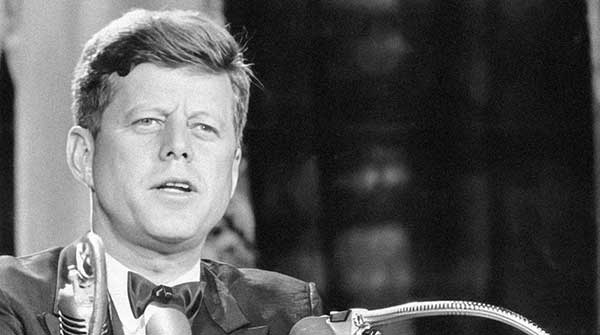Unravelling the myths and realities of the John F. Kennedy presidency. JFK was assassinated 60 years ago on Nov. 22
 As we come to the 60th anniversary of John F. Kennedy’s assassination, the question of where you were when you heard the news has become a touchstone for people of a certain age.
As we come to the 60th anniversary of John F. Kennedy’s assassination, the question of where you were when you heard the news has become a touchstone for people of a certain age.
I was a second-year university student living at home with my parents in Dublin, Ireland when a news flash stated he’d been shot. Then, while we were speculating on how serious it was, an update shortly thereafter announced his death.
It would be retrospectively respectable to say we were traumatized by the news. But such wasn’t the case.
Yes, we were shocked. However, my parents still went out to their pre-planned card game, and I went to the local cinema, something I always did on Friday nights. While waiting for the lights to go down, there was no discernible audience chatter on the topic. Life seemed to go on as usual.
 Photo by Florida Memory |
| Related Stories |
| The Road to Camelot offers fresh insights into JFK mythology
|
| John F. Kennedy: an anglophile for all seasons
|
| Did John F. Kennedy really win the U.S. presidency?
|
Things changed over the next few days as the news settled in and the assassination became a pervasive subject of conversation. You couldn’t avoid it if you tried.
And although degrees of grief varied, much of it was sincere. But not necessarily all. We’re social animals and thus feel substantial pressure to go along with the prevailing orthodoxy.
There was also an understandable desire to make some sense of it, even add a noble dimension. So two themes got substantial interlocking media play. One held that Kennedy was a martyr to the cause of civil rights, and the other portrayed him as a victim of right-wing extremism.
Emotional comfort notwithstanding, there is a problem with these lines of argument.
Kennedy’s assassin, Lee Harvey Oswald, was a communist who’d spent nearly three years as a defector in the Soviet Union. And his current passion revolved around sympathy for Cuban dictator Fidel Castro.
Whatever demons drove Oswald to shoot Kennedy, they had nothing to do with civil rights or right-wing extremism. To borrow a phrase from the author James Piereson, those who argue otherwise “have reached an instinctive conclusion about the cause of the event without any reference to the actual identity of the assassin.” They see what they want to see.
Then, as the years unfolded, other notions took hold, the most popular having to do with the Vietnam War. If he had lived, so the story goes, he would never have permitted the situation to escalate the way it did.
The attraction of this argument is obvious. When Vietnam turned into an American quagmire, Kennedy admirers wanted to posthumously disassociate him from the mess. Indeed, there’s even a version that says he had a secret plan to exit Vietnam once he was safely re-elected in 1964, and the CIA killed him to prevent that.
Of course, there’s no way of conclusively answering questions of what might have been. But the argument is still problematic.
The historical JFK was an unabashed Cold Warrior, even a hawk, which isn’t to say he wanted to go to war with the Soviet Union. That would be ridiculous.
But he was a firm believer in the proposition that American military power should be second-to-none, and should be used when America’s vital interests were at stake. And like most people who came of age in the 1930s and went on to fight in the Second World War, he had imbibed the lesson of Munich – specifically, that appeasement didn’t work.
In his 1960 election campaign, Kennedy was, if anything, more hawkish than his Republican opponent, Richard Nixon. He made much of an alleged missile gap between the United States and the Soviet Union, a gap which he claimed put America at risk. There was no such gap.
And one of his inaugural address’s most stirring invocations was the line declaring that “we shall pay any price, bear any burden, meet any hardship, support any friend, oppose any foe to assure the survival and the success of liberty.” It would be difficult to imagine a more ringing declaration of intent.
When he took office, Kennedy increased the American military “adviser” presence in South Vietnam, and the first American military fatality there occurred less than a year into his presidency. By the time he died, 50 American soldiers had been killed. Further, he approved the coup that overthrew South Vietnam’s President Diem – hardly the action of someone who was intent on disengagement.
John F. Kennedy’s murder was both a crime and a tragedy. He was a talented politician with the capacity to become a great president. Unfortunately, we’ll never know for sure.
Troy Media columnist Pat Murphy casts a history buff’s eye at the goings-on in our world. Never cynical – well, perhaps a little bit.
For interview requests, click here.
The opinions expressed by our columnists and contributors are theirs alone and do not inherently or expressly reflect the views of our publication.
© Troy Media
Troy Media is an editorial content provider to media outlets and its own hosted community news outlets across Canada.
